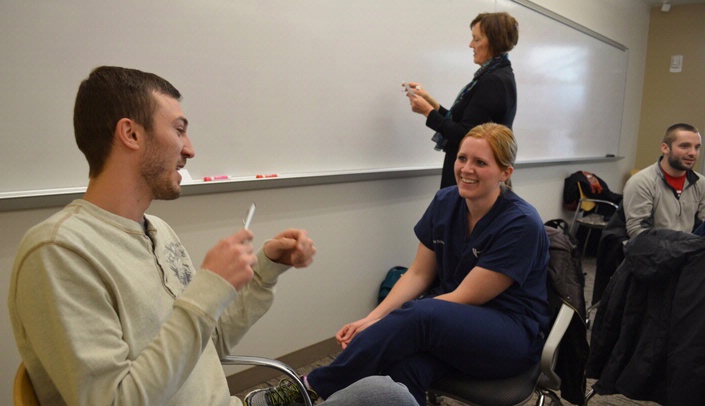In professional sports, you wouldn’t expect members of a team to play a big game before having a chance to practice together. Yet in health care, this is what is asked of many of our students.
Over the past several years, health care has started to evolve from a model described as “siloed” — where everyone did their respective job and only interacted on occasion — toward models built around a team-based, interprofessional approach.
“In recent years, fueled by concerns about patient experience and quality of care, there has been increasing emphasis on team-based care,” said Devin Nickol, M.D., assistant dean for interprofessional education (IPE). “Evidence in support of this approach continues to grow and is starting to drive practice structures and even reimbursement.
“Eventually our students are going to practice in a team-based environment, and they will need to work well together. That’s why IPE is growing in importance and why UNMC is eager to be a leader in this exciting area.”
IPE has expanded significantly at UNMC since 2008, when students were invited, not required, to participate in a campuswide “IPE Day.”
Built on the success of that first event, there are currently two required events annually for first-year students.
On Feb. 28, for the first time, second-year students across campus will participate in IPE training that builds on the first-year program.
An increasing number of smaller-scale activities are being developed to provide IPE experiences for students during clinical rotations.
|
|
To better manage these efforts, a centralized committee has been created that designs and evaluates content based on national IPE competencies such as understanding team roles, teamwork, and showing respect for others on the team, Dr. Nickol said.
Last year, the accrediting body for U.S. medical schools mandated that schools train medical students in team-based care. Other professions already have IPE-related language included in their accreditation standards.
Other changes include continuing education for faculty. On Feb. 12, the faculty development office sponsored two events for faculty wanting to learn about IPE.
“Many of us went through our training before IPE was emphasized,” Dr. Nickol said. “Our goal now is to teach using a model that progresses naturally from interprofessional training to practice.”
UNMC students have shown genuine interest in IPE, and recently formed a student IPE Society that provides mentorship to local high school students and input to the campus IPE curriculum.
